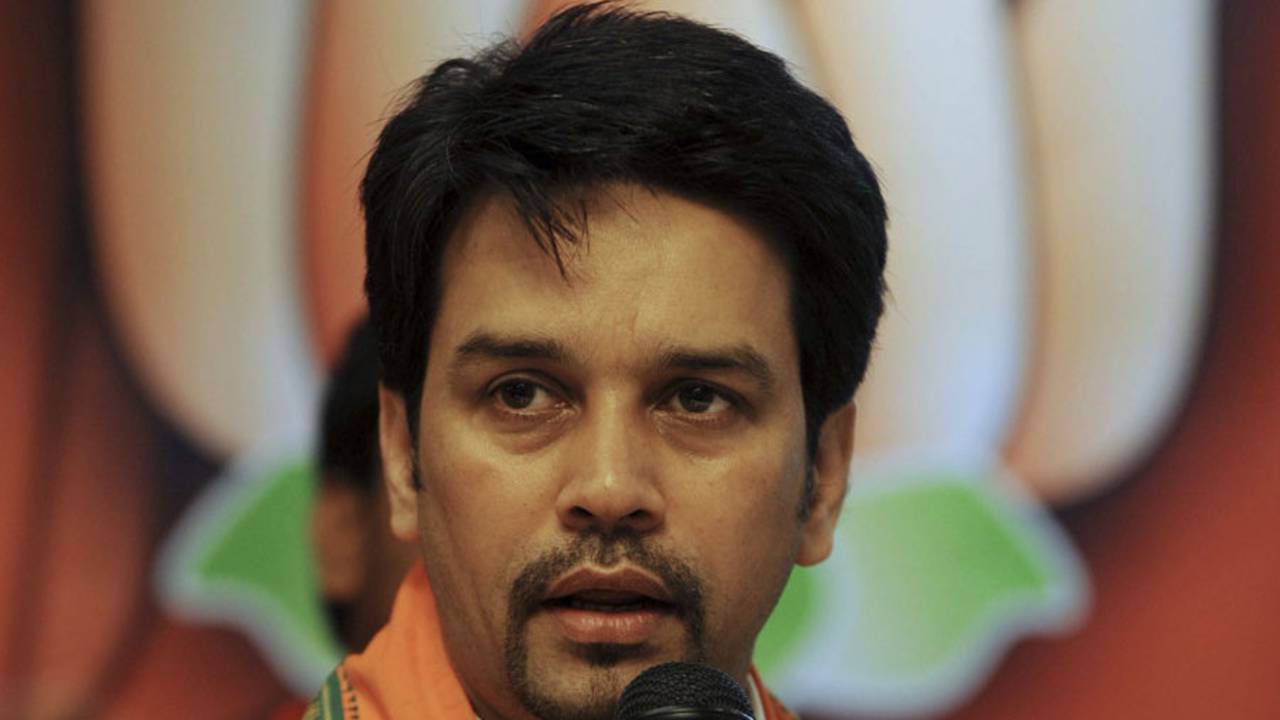Time running out for IPL governing council formation
The power struggle within the board has resulted in a delay in the formation of the IPL governing council, and a few key sub-committees
Amol Karhadkar
02-Apr-2015
BCCI secretary Anurag Thakur and president Jagmohan Dalmiya are likely to meet and finalise the formation of the sub-committees, including the IPL governing council • Getty Images
The composition of the Indian Premier League governing council, along with a few key sub-committees in the BCCI, is still undecided - a result of the power struggle that overshadowed the board's annual general meeting last month.
With less than a week before the start of IPL 2015, the main reason cited in BCCI corridors for the delay in formation of committees is the lack of agreement between various factions following the BCCI election and AGM on March 2. While Jagmohan Dalmiya was elected BCCI president unanimously, Anurag Thakur challenged the ruling N Srinivasan group, and defeated Sanjay Patel for the post of BCCI secretary. The Srinivasan group, however, holds an edge in terms of the number of other office-bearers. Barring Thakur and Dalmiya, the other seven major posts were won by the faction.
It is understood that Srinivasan is pushing for Ranjib Biswal to continue as chairman of the IPL governing council. Biswal took over as chief after Rajiv Shukla's resignation from the position following the 2013 corruption scandal. It is believed, however, that Dalmiya does not enjoy a cordial relationship with Biswal, a staunch Srinivasan supporter, and is reluctant to continue with the arrangement.
It is understood that Dalmiya is not pushing for a specific candidate to head the governing council but would prefer anyone other than Biswal. In a recent meeting with Srinivasan in Kolkata, Dalmiya is understood to have pressed for the inclusion of former India captain Sourav Ganguly, also a joint secretary of Cricket Association of Bengal, as a member of the governing council.
Despite Dalmiya's objections, Biswal is likely to head the IPL until the next BCCI AGM, which is scheduled for September. The BCCI members have been looking to Thakur, who is also politician, to break the deadlock and an insider revealed that the IPL governing council and NCA board will be constituted in the next couple of days.
The appointments were also affected after Thakur left for Australia to watch the World Cup semi-final and final. He was expected to consult with Dalmiya on his return on Wednesday but the latter has been busy with internal functions of the Cricket Association of Bengal. As a result, the duo could not finalise the committee compositions even on Thursday.
According to the BCCI rulebook, it is the IPL governing council's prerogative to form the Operational Rules committee, which looks into the violation of the Code of Conduct by players and support staff members during the tournament. If the BCCI fails to constitute the IPL governing council in time for IPL 2015, it may open up yet another window for the BCCI detractors to question the move in a court.
Besides the IPL governing council, the other major sub-committees that are needed to be constituted on a priority basis are the National Cricket Academy board and the disciplinary committee.
The NCA board was headed by TC Mathew, another Srinivasan loyalist. Last year, the NCA board had decided to revamp the domestic cricket development structure. It had decided to do away with the three specialist academies -in Mumbai (batting), Mohali (pace-bowling) and Chennai (spin-bowling) - and instead start five zonal academies.
With the BCCI engrossed in legal tussles over the last year, the decision has remained only on paper, and it is imperative for the NCA board to be formed to kickstart the revamp. In fact, at the NCA headquarters in Bangalore, the procedure to appoint batting, bowling and fielding coaches cannot begin unless the academy board is appointed.
One of the more immediate issues requiring the attention of the disciplinary committee, which usually includes the board president and two vice-presidents is the decision on Baroda allrounder Yusuf Pathan's breach of the code of conduct during the Ranji Trophy. Pathan had invited a spectator into the dressing room and slapped him for passing indecent remarks during Baroda's league game against Jammu & Kashmir. Since he was reported for a Level 4 offence by the match referee, the punishment needs to be decided by the disciplinary committee.
In a set-up like the BCCI, where the roles of the president and secretary are more important, the board's functioning has not been affected much due to the non-composition of sub-committees. However, if it fails to appoint these three sub-committees at the earliest, there could be more controversies for an organisation already embroiled in numerous court cases.
Amol Karhadkar is a correspondent at ESPNcricinfo
